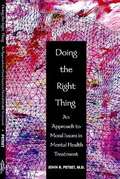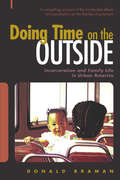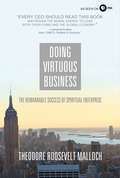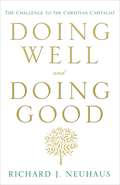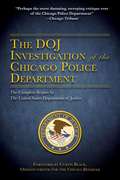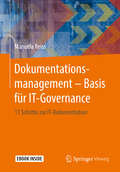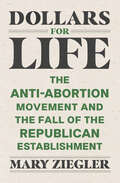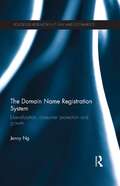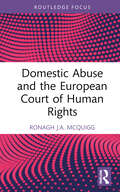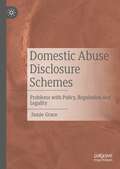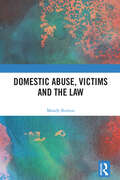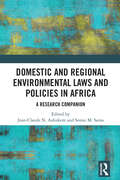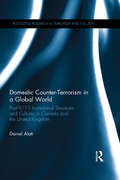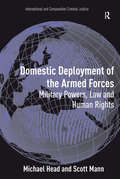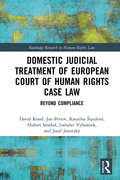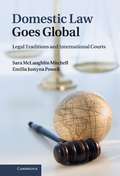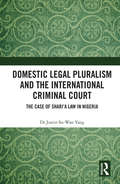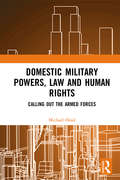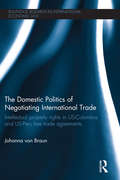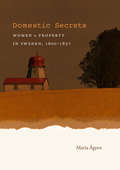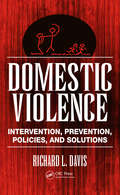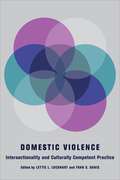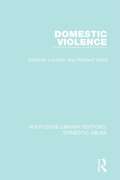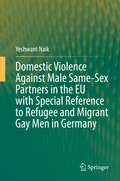- Table View
- List View
Doing the Right Thing: An Approach to Moral Issues in Mental Health Treatment
by John R. Peteet<p>Here is the first practical guide for dealing with the moral issues that regularly confront clinicians in their work. Written for all mental health professionals, Doing the Right Thing: An Approach to Moral Issues in Mental Health Treatment offers a framework both for making moral decisions concerning the treatment of patients and for helping patients deal with their own moral concerns. <p>Drawing on current thinking in several disciplines, Doing the Right Thing introduces the concept of moral functioning as a basis for therapeutic influence. Numerous case examples illustrate how to * Assess patients' ability to function morally -- Learn how six basic capacities needed for moral functioning develop, and how identifying problems in an individual's moral functioning can help guide the formulation of a treatment plan.* Treat patients with problems functioning morally -- Appreciate when it is time to set aside neutrality as a therapeutic stance in favor of a more direct approach to helping patients make moral commitments, decisions and self-assessments and develop moral character.* Deal with the moral aspects of clinical decision-making -- Develop a framework for making moral choices in planning the direction of treatment, confronting resistance and addressing problems in caring effectively. * Help patients address moral challenges -- Learn how to take into account your own and the patient's values in reasoning through moral dilemmas. Understand more clearly how to help patients deal with unfair pain caused by others, as well as the guilt and shame caused by their own moral failures.* Employ the therapeutic potential of moral growth, transformation, and integration -- Discover the role of a clinician in helping demoralized patients reformulate their ideals for better outcomes. Recognize where a moral paradigm is useful in improving the delivery of mental health care. <p>Concise, clear, and clinically relevant, Doing the Right Thing is a valuable, thought-provoking guide for both new and seasoned mental health practitioners who live and work in a morally complex environment. It is also an excellent supplementary text for courses dealing with the practice of psychotherapy and the ethical aspects of mental health care.</p>
Doing Time on the Outside: Incarceration and Family Life in Urban America
by Donald Braman"Stigma, shame and hardship---this is the lot shared by families whose young men have been swept into prison. Braman reveals the devastating toll mass incarceration takes on the parents, partners, and children left behind. " -Katherine S. Newman "Doing Time on the Outsidebrings to life in a compelling way the human drama, and tragedy, of our incarceration policies. Donald Braman documents the profound economic and social consequences of the American policy of massive imprisonment of young African American males. He shows us the link between the broad-scale policy changes of recent decades and the isolation and stigma that these bring to family members who have a loved one in prison. If we want to understand fully the impact of current criminal justice policies, this book should be required reading. " -Mark Mauer, Assistant Director, The Sentencing Project "Through compelling stories and thoughtful analysis, this book describes how our nation's punishment policies have caused incalculable damage to the fabric of family and community life. Anyone concerned about the future of urban America should read this book. " -Jeremy Travis, The Urban Institute In the tradition of Elijah Anderson'sCode of the Streetand Katherine Newman'sNo Shame in My Game, this startling new ethnography by Donald Braman uncovers the other side of the incarceration saga: the little-told story of the effects of imprisonment on the prisoners' families. Since 1970 the incarceration rate in the United States has more than tripled, and in many cities-urban centers such as Washington, D. C. -it has increased over five-fold. Today, one out of every ten adult black men in the District is in prison and three out of every four can expect to spend some time behind bars. But the numbers don't reveal what it's like for the children, wives, and parents of prisoners, or the subtle and not-so-subtle effects mass incarceration is having on life in the inner city. Author Donald Braman shows that those doing time on the inside are having a ripple effect on the outside-reaching deep into the family and community life of urban America. Braman gives us the personal stories of what happens to the families and communities that prisoners are taken from and return to. Carefully documenting the effects of incarceration on the material and emotional lives of families, this groundbreaking ethnography reveals how criminal justice policies are furthering rather than abating the problem of social disorder. Braman also delivers a number of genuinely new arguments. Among these is the compelling assertion that incarceration is holding offenders unaccountable to victims, communities, and families. The author gives the first detailed account of incarceration's corrosive effect on social capital in the inner city and describes in poignant detail how the stigma of prison pits family and community members against one another. Drawing on a series of powerful family portraits supported by extensive empirical data, Braman shines a light on the darker side of a system that is failing the very families and communities it seeks to protect.
Doing Virtuous Business
by Theodore Roosevelt MallochCan the concept of "Spiritual Capital" actually ensure a company's success?Critics of capitalism view big businesses as insatiable masters of the universe with little regard for the public. They label those who create wealth as greedy, malicious, and unscrupulous. Doing Virtuous Business answers these charges head-on. In this insightful and original book, Theodore Roosevelt Malloch presents the bold idea that the creation of wealth by virtuous means is the most important thing that can be done for society.Doing Virtuous Business explains the true purpose of business and illuminates the connection between a free economy and religious liberty. Drawing from the notion of "social capital," which has been developed by generations of scholars, Malloch adds the concept of "spiritual capital" as a foundation for social progress and also a necessity for responsible and successful enterprise. He details the virtues that sustain a business and a free market--virtues that build up a network of trust, which is critical to the global economy.Malloch reveals that a company's soul determines its "spiritual capital," an equally imperative foundation to success. From Wal-Mart to IBM, Malloch demonstrates how companies that operate on ethical models informed by spiritual traditions have outperformed their competitors. This book is a welcome moral defense of free enterprise and a sensible guide for achieving the ideal of virtuous business. Besides making the world a better place, Malloch argues, virtuous enterprise makes companies far more successful and profitable than they otherwise would be. He presents case studies of virtuous business in the Judeo-Christian tradition as well as statistical analysis demonstrating how companies that operate on ethical models have outperformed their competitors over the long run.
Doing Well and Doing Good: The Challenge to the Christian Capitalist
by Richard J. NeuhausWith this timely reissue, Image celebrates the twentieth anniversary of an important, classic work on faith and economics from one of the leading Catholic intellectuals of the past century.As pertinent today as it was when it was first published in 1992, Doing Well and Doing Good argues that for too long Christianity has had nothing to say to Wall Street or to Main Street. Some churches have blasted the greed of the former or the bourgeois grasping of the latter. Others have insisted on a socialist alternative. But the time has come, Neuhaus says, to stop such silliness. Drawing on the writings of Pope John Paul II, Richard Neuhaus has written a classic, groundbreaking work that unashamedly seeks to bestow a blessing on business. The common good depends on it.
The DOJ Investigation of the Chicago Police Department: The Complete Report by The United States Department of Justice
by Department of Justice Curtis Black“Perhaps the most damning, sweeping critique ever of the Chicago Police Department.” —Chicago Tribune Chicago, 2016. In a time of civil unrest in America, when racism, brutality, and division have taken prominent places in the daily news, the federal government conducted an investigation into the affairs of the Chicago Police Department. It is only one of many instances where the federal government has issued investigations of law enforcement across the nation before President Obama’s term expired. In a searing report, the department of justice examines Chicago’s law enforcement officers and officials for period of nearly thirteen months, digging to uncover moral and legal infractions committed within the department. Revealed is a pattern of aggression, lack of training, excessive use of force, racism and racial profiling, among other misconduct. Read the report in its entirety here. This edition is sure to provide readers with eye-opening insight into an epidemic of injustice and oppression across a divided nation.
Dokumentationsmanagement – Basis für IT-Governance
by Manuela ReissIm Buch erfahren Sie nicht nur, warum IT-Dokumentation ein wichtiges Managementwerkzeug ist, sondern auch, wie Sie dieses Werkzeug Schritt für Schritt einrichten und pflegen. Im Fokus steht das von der Autorin entwickelte und in der Praxis erprobte Vorgehensmodell zum Aufbau einer ganzheitlichen und managementorientierten IT-Dokumentation zur Unterstützung von IT-Governance. Mit seinem Glossar leistet das Buch darüber hinaus einen Beitrag zur Standardisierung der Begriffe, die im Umfeld des Themas Dokumentation verwendet werden. Damit richtet sich das Buch an alle, die sich wissenschaftlich fundiert mit der praktischen Umsetzung der IT-Dokumentation auseinandersetzen möchten.
Dollars for Life: The Anti-Abortion Movement and the Fall of the Republican Establishment
by Mary ZieglerA new understanding of the slow drift to extremes in American politics that shows how the antiabortion movement remade the Republican Party &“A timely and expert guide to one of today&’s most hot-button political issues.&”—Publishers Weekly (starred review) &“A sober, knowledgeable scholarly analysis of a timely issue.&”—Kirkus Reviews &“[Ziegler&’s] argument in [is] that, over the course of decades, the anti-abortion movement laid the groundwork for an insurgent candidate like Trump.&”—Jennifer Szalai, New York Times The modern Republican Party is the party of conservative Christianity and big business—two things so closely identified with the contemporary GOP that we hardly notice the strangeness of the pairing. Legal historian Mary Ziegler traces how the anti-abortion movement helped to forge and later upend this alliance. Beginning with the Supreme Court&’s landmark decision in Buckley v. Valeo, right‑to‑lifers fought to gain power in the GOP by changing how campaign spending—and the First Amendment—work. The anti-abortion movement helped to revolutionize the rules of money in U.S. politics and persuaded conservative voters to fixate on the federal courts. Ultimately, the campaign finance landscape that abortion foes created fueled the GOP&’s embrace of populism and the rise of Donald Trump. Ziegler offers a surprising new view of the slow drift to extremes in American politics—and explains how it had everything to do with the strange intersection of right-to-life politics and campaign spending.
El dolor de los inocentes
by Julio Scherer IbarraEste sólido análisis jurídico-político de la guerra del presidente Calderón contra el narcotráfico (muchos de ellos víctimas inocentes), tiene el propósito de acreditarle responsabilidades legales que eventualmente posibilitarían un juicio en su contra. ¿Quién paga por los inocentes? ¿Quién reivindica su muerte? Cincuenta mil muertos, diez mil desaparecidos. Muchos de ellos eran inocentes. Mexicanos y extranjeros que pasaban por ahí, que estaban en el lugar equivocado, que trataban de llevar su vida en paz, que se hallaron entre el fuego cruzado, que cayeron víctimas de ataques, operativos o levantones. En el marco de la guerra emprendida por el gobierno del presidente Felipe Calderón, las autoridades han hablado en innumerables ocasiones de "daños colaterales", pero nunca han afrontado la pregunta más urgente: ¿quién debe responder por las muertes de esos inocentes? En este esclarecedor análisis, Julio Scherer Ibarra aborda los fundamentos jurídicos y políticos del Estado como garante de la seguridad y el orden para establecer hasta dónde han fallado las directivas del combate al narcotráfico. Al optar por un enfrentamiento bélico, más allá de las atribuciones reales que la Constitución le brinda al Ejecutivo federal, y en detrimento de otras posibles soluciones como la suspensión de garantías en ciertas partes del territorio nacional, la violencia se exacerbó y terminó con las vidas de miles de inocentes. ¿Habrá manera de llamar a cuentas a aquellos que han engendrado tanto dolor? En busca de respuestas, el autor desmenuza las leyes nacionales e internacionales que nos rigen, con el propósito de establecer cuáles responsabilidades políticas, penales, administrativas y civiles pueden fincarse por la aciaga decisión unilateral de haber sacado al ejército de los cuarteles para enfrentar a la delincuencia organizada.
The Domain Name Registration System: Liberalisation, Consumer Protection and Growth (Routledge Research in Information Technology and E-Commerce Law)
by Jenny NgThis book offers a comparative analysis of the domain name registration systems utililsed in Australia and the United Kingdom. Taking an international perspective, the author analyses the global trends and dynamics of the domain name registration systems and explores the advantages and disadvantages of restrictive and less restrictive systems by addressing issues of consumer protection. The book examines the regulatory frameworks in the restrictive and unrestrictive registration systems and considers recent developments in this area. Jenny Ng also examines the legal and economic implications of these regulatory frameworks, drawing upon economic theory, regulatory and systems theory as well as applying rigorous legal analysis. In doing so, this work proposes ways in which such systems could be better designed to reflect the needs of the specific circumstances in individual jurisdictions. The Domain Name Registration System will be of particular interest to academics and students of IT law and e-commerce.
Domestic Abuse and the European Court of Human Rights (Routledge Research in Human Rights Law)
by Ronagh J.A. McQuiggThis book provides a detailed critical analysis of the jurisprudence of the European Court of Human Rights on domestic abuse. Such abuse affects vast numbers of people throughout all nations of the world. Although it was not until 2007 that domestic abuse was considered substantively by the European Court of Human Rights, it has now been established that such abuse can constitute a violation of the right to life under Article 2 of the European Convention on Human Rights; the right to be free from torture or inhuman or degrading treatment under Article 3; the right to respect for private and family life under Article 8; and the prohibition of discrimination under Article 14. The book analyses how conceptualisations of domestic abuse in the Court's jurisprudence have evolved, for example, in relation to a more consistent use of Article 3 in such cases, a recognition of coercive control, and the framing of domestic abuse as gender-based discrimination. It also explores the development of the Court's understanding of domestic abuse, for example, as regards to how the ‘Osman test’ should be applied in this context. Additionally, the book discusses the Court's approach to issues such as cyber violence and child contact in the context of domestic abuse. The book will appeal to academics and researchers from a wide variety of disciplines, such as criminal law, criminology, social policy, human rights, family law, gender studies and sociology, as well as practitioners and those in the voluntary sector who are working in the area of combating domestic abuse. The book could also be used beneficially on courses at both undergraduate and postgraduate levels which incorporate the topic of domestic abuse.
Domestic Abuse Disclosure Schemes: Problems with Policy, Regulation and Legality
by Jamie GraceThis book draws on empirical work to examine the debates surrounding domestic violence disclosure schemes (also known as Clare's Law), focussing on England and Wales with comparisons to similar jurisdictions. Clare's Law allows any member of the public the right to ask the police if their partner may pose a risk to them. This book sets out a coherent methodology for analysing these schemes which are growing in popularity. It discusses their pros and cons and the challenges with operating and regulating them. It ultimately seeks to examine whether the disclosure of information concerning the criminal history of one person to that person's intimate partner will ultimately increase the likelihood of keeping their partner safe. It speaks to academics working in the domestic violence / regulation/ criminal justice/ criminology fields as well as by policy makers in front line services and government agencies.
Domestic Abuse, Victims and the Law
by Mandy BurtonThe gap between what the law and legal processes deliver for victims of domestic abuse and what they actually need has, in some instances, arguably widened. This book provides the reader with a thorough understanding of the remedies available to victims in the civil, family and criminal law. It contends that expectations of the legal remedies have increased as the number and scope of remedies has proliferated. It further examines how legal responses to domestic abuse have evolved over the past decade and explores how the victim’s rights narrative and associated litigation, which has become prevalent in legal discourse and criminal justice reforms, has shifted expectations and impacted domestic abuse policy and law. The book presents a valuable addition to the literature in drawing on a discourse familiar to those with an interest in human rights, demonstrating its impact on a substantive area of law of great significance to both family and criminal lawyers and anyone with an interest in domestic abuse and legal responses.
Domestic and Regional Environmental Laws and Policies in Africa: A Research Companion
by Jean-Claude N. Ashukem Semie M. SamaThis book explores African domestic and regional responses and approaches to environmental protection and sustainability. Written by African experts, the collection consists of five parts covering the whole of Africa. It provides broad coverage of specific themes, including environmental constitutionalism, climate change, gender and the environment, wildlife trade, environmental justice, and human displacement. The key aims are first, to explore theoretical and empirical studies to interrogate and provide clarity on academic discourse on how and whether environmental human rights approaches and policy implications have effectively enhanced environmental protection and sustainability at African domestic levels. Second, to investigate and present innovative solutions on how African domestic legal regimes deal with environmental justice, natural resources governance, refugees’ environmental rights, and climate-induced displaced persons. Finally, to propose innovative legal and institutionalised solutions to Africa’s ecological realities by determining the legal and regulatory gaps on environmental human rights issues on the continent. The collection will be a valuable resource for researchers, academics, and policymakers in human rights law, environmental law, political science, ecology and conservation, environmental management, disaster management, and development studies.
Domestic Counter-Terrorism in a Global World: Post-9/11 Institutional Structures and Cultures in Canada and the United Kingdom (Routledge Research in Terrorism and the Law)
by Daniel AlatiAlthough both Canada and the United Kingdom had experienced terrorism prior to the attacks of 9/11 and already had in place extensive provisions to deal with terrorism, the events of that day led to the enactment of new and expansive counter-terrorism legislation being enacted in both jurisdictions. This book explores these changes to counter-terrorism laws and policies in the UK and Canada in order to demonstrate that despite the force of international legal instruments, including the heavily scrutinized UN Security Council Resolution 1373, the evolution of counter-terrorism policies in different jurisdictions is best analyzed and understood as a product of local institutional structures and cultures. The book compares legal and political structures and cultures within Canada and the United Kingdom. It analyses variations in the evolution post-9/11 counter-terrorism measures in the two jurisdictions and explores the domestic reasons for them. While focus is primarily geared towards security certificates and bail with recognizance/investigative hearings in Canada, and detention without trial, control orders and TPIMs in the UK, the use of secret evidence in the wider national security context (terrorist listing, civil litigation, criminal prosecutions, etc.) is also discussed. The book reveals how domestic structures and cultures, including the legal system, the relative stability of government, local human rights culture, and geopolitical relationships all influence how counter-terrorism measures evolve. In this sense, the book utilizes a methodology that is both comparative and interdisciplinary by engaging in legal, political, historical and cultural analyses. This book will be particularly useful for target audiences in the fields of comparative law and criminal justice, counter-terrorism law, human rights law, and international relations and politics.
Domestic Deployment of the Armed Forces: Military Powers, Law and Human Rights (International And Comparative Criminal Justice Ser.)
by Scott Mann Michael HeadUntil recently, internal use of the armed forces has been generally regarded by the public, as well as academic commentators, as conduct to be expected of a military or autocratic regime, not a democratic government. There is however growing concern that the 'war on terror' has been used to condition public opinion to accept the internal deployment of the armed forces, including for broader industrial and political purposes. This book examines the national and international law, human rights and civil liberties issues involved in governments calling out troops to deal with civil unrest or terrorism. As the introduction of military call-out legislation has become an emerging global trend in the opening years of the 21st century, there is considerable and growing interest in the constitutional and related problems surrounding the deployment of military forces for domestic purposes. Examining the changes underway in six comparable countries, the United States, Canada, Britain, Germany, Japan and Australia, this book provides a review and analysis of this trend, including its implications for legal and political rights.
Domestic Judicial Treatment of European Court of Human Rights Case Law: Beyond Compliance (Routledge Research in Human Rights Law)
by David Kosař Jan Petrov Katarína Šipulová Hubert Smekal Ladislav Vyhnánek Jozef JanovskýThe European Court of Human Rights (“ECtHR”) suffers from the burgeoning caseload and challenges to its authority. This two-pronged crisis undermines the ECtHR’s legitimacy and consequently the functioning of the whole European human rights regime. Domestic courts can serve as welcome allies of the Strasbourg Court. They have a potential to diffuse Convention norms domestically, and therefore prevent and filter many potential human rights violations. Yet, we know very little about how domestic courts actually treat the Strasbourg Court’s rulings. This book brings unique empirical findings on how often, how and with what consequences domestic judges work with the ECtHR’s case law. It moves beyond the narrow concept of compliance and develops a new three-level methodology for analysing the role played by domestic courts in the implementation of ECtHR case law. Moreover, using the example of Czechia, it shifts the attention from Western countries to a more volatile Central and Eastern European region, which has recently witnessed democratic backsliding and backlash against international checks on human rights and the rule of law standards. Looking at a wider social and legal context, this book identifies factors helping transitional countries to adapt to regional human rights regimes. The work will be an essential resource for students, academics and policy-makers working in the areas of Constitutional law, Politics and Human Rights law. Its global appeal is enhanced by the methodological framework which is applicable in other international systems.
Domestic Law Goes Global
by Emilia Justyna Powell Sara Mclaughlin MitchellInternational courts have proliferated in the international system, with over one hundred judicial or quasi-judicial bodies in existence today. This book develops a rational legal design theory of international adjudication in order to explain the variation in state support for international courts. Initial negotiators of new courts, 'originators', design international courts in ways that are politically and legally optimal. States joining existing international courts, 'joiners', look to the legal rules and procedures to assess the courts' ability to be capable, fair and unbiased. The authors demonstrate that the characteristics of civil law, common law, and Islamic law influence states' acceptance of the jurisdiction of international courts, the durability of states' commitments to international courts, and the design of states' commitments to the courts. Furthermore, states strike cooperative agreements most effectively in the shadow of an international court that operates according to familiar legal principles and rules.
Domestic Legal Pluralism and the International Criminal Court: The Case of Shari'a Law in Nigeria
by Justin Su-Wan YangThis book explores how the unique historical development of Islamic Shari’a criminal law alongside English common law in northern Nigeria has created a hybridised criminal legal system through a pluralist dynamic of mutual accommodation. It studies how this system may potentially be accommodated by the International Criminal Court. The work examines how this could be accommodated through the current understanding and operation of complementarity, and that it could ultimately prove to be preferable in encouraging the Shari’a courts to exercise criminal justice over the radical insurgents in northern Nigeria. These courts would have the unprecedented ability to combine binding adjudicative judgments together with religious interpretation and guidance, which can directly combat the predominantly unchallenged domain of ideology by extremist actors. It is submitted that these pluralist perspectives are timely and welcome, given the undeniably Western European foundations of modern International Criminal Law. In exploring such potential avenues, our shared understanding of modern international criminal justice is widened to necessarily include other stakeholders beyond its Western founders. It is the aim and hope that such interactions and engagements with non-Western traditions and cultures will lead to a greater shared ownership of the international criminal justice project, which will only strengthen the global fight against impunity. The book will be essential reading for academics, researchers and policy-makers working in the areas of International Criminal Law, Legal Pluralism, Islamic Shari’a Law, Nigeria, and religiously-inspired violence.
Domestic Military Powers, Law and Human Rights: Calling Out the Armed Forces
by Michael HeadThis book examines the national and international law, human rights and civil liberties issues involved in governments calling out the armed forces to deal with civil unrest or terrorism. The introduction of domestic military powers has become an international trend. Troops already have been seen on the streets in major Western democracies. These developments raise major political, constitutional and related problems. Examining the changes underway in eight comparable countries—the United States, Canada, Britain, France, Italy, Germany, Japan and Australia—this book provides a review and analysis of this trend, including its implications for legal and political rights. The book will be of interest to the general public, as well as students, academics and policy-makers in the areas of human rights and civil liberties, constitutional law, criminal justice and security studies.
The Domestic Politics of Negotiating International Trade: Intellectual Property Rights in US-Colombia and US-Peru Free Trade Agreements (Routledge Research in International Economic Law)
by Johanna von BraunThe Domestic Politics of International Trade considers the issues surrounding intellectual property rights in international trade negotiations in order to examine the challenges posed to domestic policy-makers by the increasingly broad nature of Free Trade Agreements (FTAs). Throughout the book the author demonstrates the importance of domestic politics in understanding the nature and outcome of international negotiations, particularly as they relate to international economic diplomacy. The book looks in detail at the intellectual property negotiations which formed part of the US-Peru and US-Colombia Free Trade Agreements and analyses the extent to which public health authorities and other parties affected by the increased levels of intellectual property protection were integrated into the negotiation process. The book then juxtaposes these findings with an analysis of the domestic origins of US negotiation objectives in the field of intellectual property, paying particular attention to the role of the private sector in the development of these objectives. Based on a substantial amount of empirical research, including approximately 100 interviews with negotiators, capital based policy-makers, private sector representatives, and civil society organisations in Lima, Bogotá and Washington, DC, this book offers a rare account of different stakeholders’ perceptions of the FTA negotiation process. Ultimately, the book succeeds in integrating the study of domestic politics with that of international negotiations. This book will be of particular interest to academics as well as practitioners and students in the fields of international law, economic law, intellectual property, political economy, international relations, comparative politics and government.
Domestic Secrets: Women and Property in Sweden, 1600-1857
by Maria AgrenBetween the seventeenth and nineteenth centuries, women's role in the Swedish economy was renegotiated and reconceptualized. Maria Agren chronicles changes in married women's property rights, revealing the story of Swedish women's property as not just a simple narrative of the erosion of legal rights, but a more complex tale of unintended consequences. A public sphere of influence--including the wife's family and the local community--held sway over spousal property rights throughout most of the seventeenth century, Agren argues. Around 1700, a campaign to codify spousal property rights as anarcanum domesticum, or domestic secret, aimed to increase efficiency in legal decision making. New regulatory changes indeed reduced familial interference, but they also made families less likely to give land to women. The advent of the print medium ushered property issues back into the public sphere, this time on a national scale, Agren explains. Mass politicization increased sympathy for women, and public debate popularized more progressive ideas about the economic contributions of women to marriage, leading to mid-nineteenth-century legal reforms that were more favorable to women. Agren's work enhances our understanding of how societies have conceived of women's contributions to the fundamental institutions of marriage and the family, using as an example a country with far-reaching influence during and after the Enlightenment.
Domestic Violence: Intervention, Prevention, Policies, and Solutions
by Richard L. DavisDomestic violence does not begin the day an adult heterosexual male decides to beat and batter an adult heterosexual female. Domestic violence is a complicated and multifaceted enigma that includes child, sibling, spousal, intimate partner, and elder abuse. Despite spending billions of dollars on domestic violence, the number of some categories of
Domestic Violence: Intersectionality and Culturally Competent Practice (Foundations of Social Work Knowledge Series)
by Lettie L. Lockhart Fran S. Danis Eds.In Domestic Violence: Intersectionality and Culturally Competent Practice, experts working with twelve unique groups of domestic abuse survivors provide the latest research on their populations and use a case study approach to demonstrate culturally sensitive intervention strategies. Chapters focus on African Americans, Native Americans, Latinas, Asian and Pacific Island communities, persons with disabilities, immigrants and refugees, women in later life, LGBT survivors, and military families. They address domestic violence in rural environments and among teens, as well as the role of religion in shaping attitudes and behavior. Lettie L. Lockhart and Fran S. Danis are editors of the Council of Social Work Education's popular teaching modules on domestic violence and founding co-chairs of the CSWE symposium on violence against women and children. In their introduction, they provide a thorough overview of intersectionality, culturally competent practice, and domestic violence and basic practice strategies, such as universal screening, risk assessment, and safety planning. They follow with collaborative chapters on specific populations demonstrating the value of generalist social work practice, including developing respectful relationships that define issues from the survivor's perspective; collecting and assessing data; setting goals and contracting; identifying culturally specific interventions; implementing culturally appropriate courses of action; participating in community-level strategies; and advocating for improved policies and funding at local, state, and federal levels. Featuring resources applicable to both practitioners and clients, Domestic Violence forms an effective tool for analysis and action.
Domestic Violence (Routledge Library Editions: Domestic Abuse #5)
by Deborah Lockton Richard WardFirst published in 1997, this book marks a culmination of a three year research programme focused upon the incidence of domestic violence in Leicester. The study examined the levels of violence, the details of applicants and respondents and the nature of complaints, as well as the policies applied and the problems faced by those enforcing the law. The books sets the findings in the context of the policies on protection of victims of domestic violence, the problems they face and protection after 1997. This book will be of interest to those studying law, social work, sociology and women’s studies.
Domestic Violence Against Male Same-Sex Partners in the EU with Special Reference to Refugee and Migrant Gay Men in Germany
by Yeshwant NaikThis book deepens readers’ knowledge and understanding of the nature of domestic violence and sexual abuse involving male same-sex partners, and of dating violence against gay men and related issues in the European Union (EU). Drawing on non-probability samples, it addresses the propensities of refugees and migrant gay men in Germany and the prevalence of sexual abuse directed toward these men by illustrating their experiences as victims. In closing, the book explores the challenges of identifying sexual abuse victimization within the gay community, as well as the implications for practice, policy, and future research.
